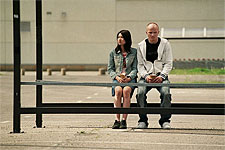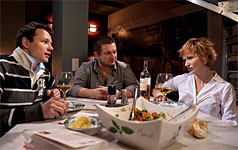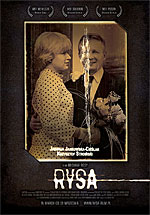 My Flesh, My Blood (Moja krew, d. Marcin Wrona, 2009).
My Flesh, My Blood (Moja krew, d. Marcin Wrona, 2009).
Director Marcin Wrona announced that the version of his debut film screened at Wrocław wasn’t necessarily the final one, and that he’d welcome suggestions for improvement. Sadly, “reshoot it from scratch with a better script” probably wasn’t a realistic option, which is a shame as that’s by far the film’s biggest problem. Eryk Lubos gave another of the competition’s standout performances as Igor, a once-promising boxer whose career has come to an abrupt halt following diagnosis of a brain tumour. Desperate to achieve something before his probably premature death, he teams up with illegal Vietnamese immigrant Yen Ha (newcomer Luu De Ly) with a proposal: they marry, she gets a work and residence permit, but has to bear Igor’s child in return. To say they’re a mismatched couple is an understatement: he’s a hulking shaven-headed brute while she’s a delicate slip of a girl (a fellow juror commented, I think rightly, that the film would have been far more interesting if she’d been plain and approaching middle age). Individual scenes are very well staged, performances are often excellent (former kickboxing champion Marek Piotrowski is particularly effective as Igor’s trainer, his own slurred speech graphically illustrating the drawbacks of his chosen profession), and the film offers rare glimpses of life in Warsaw’s immigrant ghettoes, a road usually untravelled by Polish filmmakers. But every time the film threatens to spread its wings, the contrived and melodramatic script (whose final act is particularly implausible) pulls it back to earth with a dull thud.
 Rebound (Hel, d. Kinga Dębska, 2009)
Rebound (Hel, d. Kinga Dębska, 2009)
As with rather too many of the films in the New Polish Cinema competition, this portrait of a respected psychiatrist whose previous drug issues return to haunt him suffered from an insufficiently developed script, whose Screenwriting 101 three-act structure was so upfront that I looked at my watch after what was clearly meant to be the end of act two and found that the film was almost exactly two-thirds gone. It’s a shame, because like My Flesh My Blood and The Miracle Seller there was a lot to admire, not least Paweł Królikowski’s central performance as Piotr. Initially shown as a somewhat rumpled but nonetheless assured professional, an unexpected encounter with his long-lost son Kamil (Lesław Żurek) and difficulties with his Prague-born filmmaker wife Hanka (Anna Geislerová) cause him to fall off the wagon and return to what he sees as the psychological comfort blanket of his crack-addict past, hanging out with old contacts and spending the night in a sleazy dive. The scenes in the hospitals (shot on location) are particularly effective, the characterisation of Piotr’s various patients uncomfortably plausible (especially Monika Kwiatkowska-Dejczer’s erotomaniac Ewa), and the emphasis on drab realism doesn’t completely preclude the occasional injection of gallows humour, such as the straightfaced announcement that hospital goldfish are for admiring rather than eating. But the central relationship between Piotr and Hanka never rang true for me: surely someone as sensitive as she professes herself to be wouldn’t simply dump him with little warning after what is clearly such a profound mid-life crisis?
 The Scratch (Rysa, d. Michał Rosa, 2008)
The Scratch (Rysa, d. Michał Rosa, 2008)
Probably the best example of a traditionally well-crafted drama in the competition, this arrived in Wrocław sporting a mantlepiece’s worth of prizes, and it’s easy to see why. Joanna and Jan have been married for over forty years, seemingly blissfully, until a mysterious videotape appears nestling amongst birthday presents. It contains a television interview that hints that Jan was a secret police agent who inveigled himself into her life in the 1960s in order to spy on her father, a prominent politician. This is never proved, but once the seeds of doubt are sown, she can’t stop them germinating into a gigantic thicket of suspicion and fear, no matter how many rational arguments are presented in his favour (notably from their daughter – a terrific cameo from Kinga Preis – who forcefully argues that he was much the more conscientious parent). The situation recalls that in Michael Haneke’s Hidden (Caché, 2005), but Michał Rosa’s treatment is quite different: we’re shown the world from Joanna’s viewpoint, and compelled to stand in the same quicksand. Jadwiga Jankowska-Cieślak gives an appropriately tormented performance as the distinguished entomologist who proves far less adept when it comes to studying the behaviour of her own species, but I thought Krzysztof Stroiński was even more impressive as her husband, articulating Jan’s bewilderment through a series of pained silences that were only occasionally broken by explosions of understandable frustration. It’s a powerful, often moving exploration of the way that communism’s legacy couldn’t simply end in 1989, when too many secrets still remained buried.